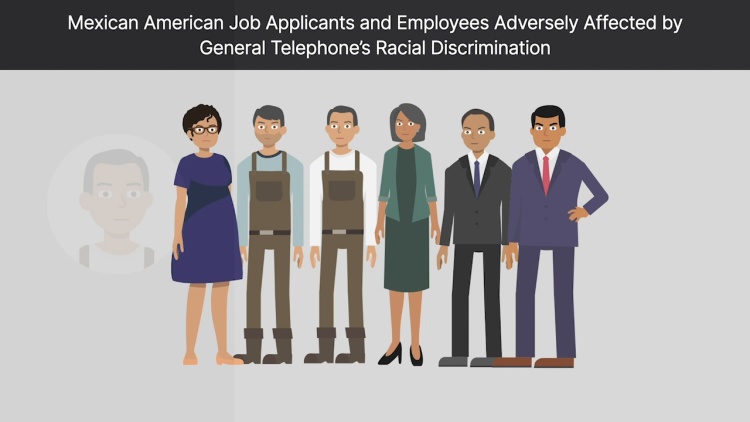General Telephone Co. v. Falcon
United States Supreme Court
457 U.S. 147 (1982)
- Written by DeAnna Swearingen, LLM
Facts
General Telephone Co. (General) (defendant) denied Falcon (plaintiff) a promotion. Falcon claimed discrimination, and the Equal Employment Opportunity Commission (EEOC) issued a right to sue letter. Falcon sued in the United States District Court for the Northern District of Texas under Title VII of the Civil Rights Act (Title VII). The complaint was filed under Federal Rules of Civil Procedure (FRCP) Rule 23(b)(2) on behalf of Mexican-Americans who were or might be subjected to General’s discriminatory employment practices. Falcon requested certification of a class that included both employees and applicants, based on the court’s approval of “‘across the board’ attack[s]” on racially discriminatory employment procedures in Johnson v. Georgia Highway Express, Inc., 417 F.2d 1122 (1969). The court certified the class without a hearing. After trial, the court held that Falcon was discriminated against with respect to promotion, but not hiring. Conversely, the court held that the class was discriminated against with respect to hiring, but not promotion. The class was awarded $67,925.49 in damages. Falcon and General appealed to the Court of Appeals for the Fifth Circuit. The court of appeals remanded. The United States Supreme Court granted certiorari to consider the propriety of class certification for both applicants and employees.
Rule of Law
Issue
Holding and Reasoning (Stevens, J.)
What to do next…
Here's why 907,000 law students have relied on our case briefs:
- Written by law professors and practitioners, not other law students. 47,100 briefs, keyed to 996 casebooks. Top-notch customer support.
- The right amount of information, includes the facts, issues, rule of law, holding and reasoning, and any concurrences and dissents.
- Access in your classes, works on your mobile and tablet. Massive library of related video lessons and high quality multiple-choice questions.
- Easy to use, uniform format for every case brief. Written in plain English, not in legalese. Our briefs summarize and simplify; they don’t just repeat the court’s language.





